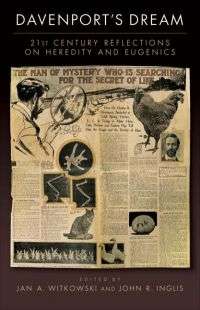Reflecting on the social implications of human genetics research -- past, present and future

In 1911, the influential geneticist Charles Davenport published Heredity in Relation to Eugenics, advancing his ideas of how genetics would improve society in the 20th century. It became a college textbook and a foundation for the widespread eugenics movement in the United States. Although the eugenic ideals of the early part of the 20th century have long been rejected, many of the issues raised by Davenport are still being debated nearly 100 years later.
In a new book, Davenport’s Dream: 21st Century Reflections on Heredity and Eugenics, 12 prominent academics discuss themes from Davenport’s book—the meaning of human genetic variation, the sources of mental illness, the influence of nature versus nurture, the processes of human evolution—in a contemporary context. His original book, which was one of the first to summarize the field of human genetics in the post-Mendel era, is reprinted along with the essays.
“[T]he problems that [Davenport and his contemporaries] sought to ameliorate and the moral and ethical choices highlighted by the eugenics movement remain a source of public interest and cautious scientific inquiry, fueled in recent years by the sequencing of the human genome and consequent revitalization of human genetics,” write the editors Jan Witkowski and John Inglis in the Preface to the book. “These thoughtful essays show very clearly that as science reveals ever more about essential aspects of human nature, we will be faced with real ethical, legal, and moral dilemmas.”
Davenport’s dream of using genetics to improve the human condition has taken new guises in the 21st century. “Today, it is argued, eugenics is back but in individual, not state-sponsored form,” writes Matt Ridley in the Foreword to the book. “People can choose the sex of their child, or choose to abort a fetus with a certain disability, or select an embryo without a detected defect or disability.”
The essays by the academics remind us of what we learned from our past mistakes and urge us to carefully and cautiously use scientific discoveries for the benefit of humankind. This book will be useful to historians of science as well as those interested in the social implications of human genetics research—past, present, and future.
Source: Cold Spring Harbor Laboratory





















